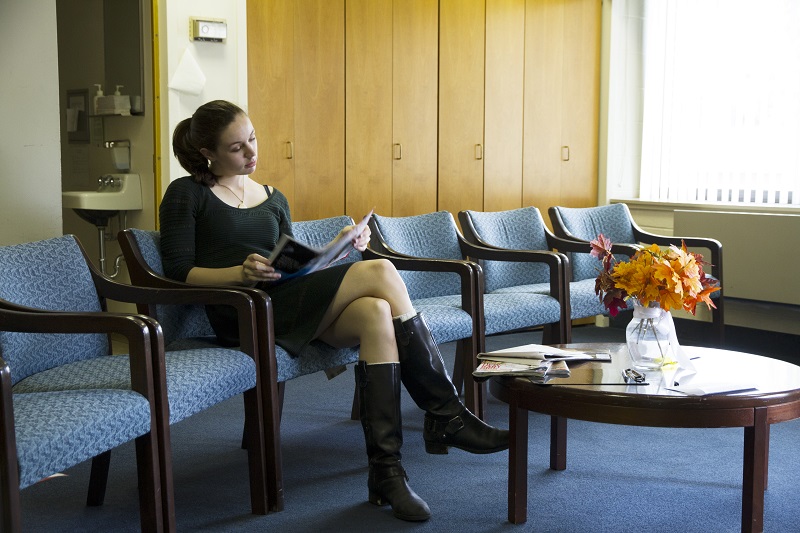Student in the waiting room of Bailey Health Center, which does not carry, but can prescribe, oral contraception as of this semester.
Photo by Hana Isihara ‘17
Bailey Health Center no longer carries oral contraceptives in stock this year, but can still prescribe them, according to an announcement made by the health center last semester, in reaction to the Affordable Care Act.
The decision was made in response to financial stress, Nurse Patricia L. Martino said. Provisions of the Affordable Care Act guarantee that individuals covered by insurance pay either nothing or a small copay for the pill, she said, but insurance companies now charge organizations who order the drug.
“What [insurance companies] were doing to balance off the price difference was to charge organizations who would order it for students,” Martino said.
Beginning this semester, the school continues to prescribe the pill, but gets the pill delivered from two local pharmacies or forces students to fill prescriptions at outside pharmacies. Plan B, however, can still be found at the health center.
Providing oral contraceptives would more than double the price of oral contraceptives, according to Martino. The ACA’s implementation caused costs to rise from $15 per pack to $45 per pack without insurance.
In the past, the Bailey Health Center was able to provide the pill for little to no cost to students. Still, the Health Center had been limited to writing prescriptions only for the drugs they could provide on their own. As a result, Lafayette was only able to carry one brand, Ortho Tri-Cyclen. Now, physicians can prescribe a wide range of pills, giving students options including both generic and name brands. When the school announced the changes last semester, the Health Center saw in increase in demand for prescriptions.
“Appointments about birth control prescriptions went up from 15 percent [when all we offered was Ortho Tri-Cyclen] to 45 percent,” Martino said.
Despite benefits of the policy, students still have mixed opinions about the change. One problem is that of convenience.
“If you don’t have a car or the means to get to a CVS than you’re kind of out of luck,” Kara Senesi ‘17 said.
Some students are also unhappy with the possibility that they may have to wait to access them and fill their prescription.
“I feel like the school taking it all away just doesn’t make sense, when a lot of people would be willing to pay the $5-10 copay to pick up their prescription immediately on campus,” Natalia Nevarez ‘17 said.
But there are a couple companies who do come to campus to deliver the pill.
“Bell Apothecary and Neighborhood RX deliver right here to campus,” Martino said.
Both pharmacies make deliveries on a near-daily basis.
Some students also said there was miscommunication on behalf of the school.
“They didn’t ask any students, ‘What do you want offered at Bailey’s?’” Nevarez said. “They just looked at costs and made the decision independently. They should have sent a survey.”
Still, students are adapting to changes.
“The change is for the best, because there are more options for people to get who want the pill,” Elizabeth Sulc ‘17 said. “I’m glad there’s more variety at a lower cost.”

























































































































